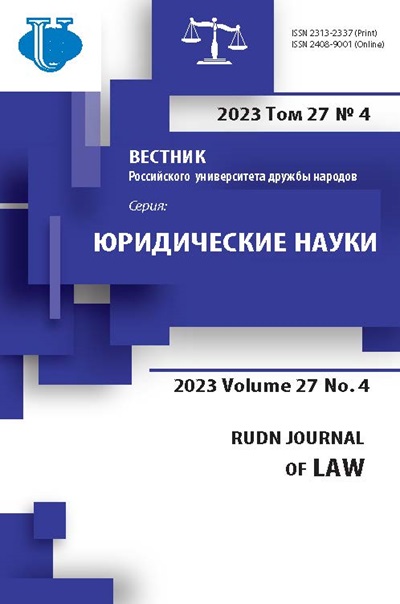Interdisciplinary bioethical approach in public law
- Authors: Polnyakova E.M.1, Tagiev E.S.2
-
Affiliations:
- Ministry of Science and Higher Education of the Russian Federation
- National Research University «Higher School of Economics»
- Issue: Vol 27, No 4 (2023)
- Pages: 939-955
- Section: ADMINISTRATIVE AND FINANCIAL LAW
- URL: https://journals.rudn.ru/law/article/view/36896
- DOI: https://doi.org/10.22363/2313-2337-2023-27-4-939-955
- EDN: https://elibrary.ru/LPGIQS
- ID: 36896
Cite item
Full Text
Abstract
The study is devoted to issues of heterogeneity of bioethics, its connection with ethics, law and administration. It highlights and analyzes some laws both at the federal level and at the level of the constituent entities of the Russian Federation, which directrly or indirectly address issues related to bioethics. Special attention is paid to analyzing the legal positions of the Constitutional Court of the Russian Federation including the issues of presumption of consent to organ and/or tissue transplantation, as well as the ethical side of surrogacy. Given the importance of issues related to bioethics, the work defines the problem of developing an optimal balance between application of legal norms and their effect, as well as the use of bioethics and its principles for the most correct and fair resolution of problems arising in society. Based on the analysis of foreign sources, an attempt is made to review legal regulation of medicine, health care and biotechnology, the most problematic from the point of view of bioethics. The study highlights problems connected with the lack of formally defined and systematic legal regulation of bioethics as well as the position regarding consolidation of provisions aimed at regulating ethical and moral components in regulatory legal acts. Moreover, the work touches upon issues related to the activities of independent organizations whose main activity is the formation of bioethical principles aimed at implementing norms to address emerging ethical issues in Russian legislation.
About the authors
Ekaterina M. Polnyakova
Ministry of Science and Higher Education of the Russian Federation
Email: polniakovaem@minobrnauki.gov.ru
ORCID iD: 0009-0006-7917-1815
Deputy Director of the Legal Department of the Ministry of Science and Higher Education of the Russian Federation
11 Tverskaya Str., Moscow, 125009, Russian FederationElvin S. Tagiev
National Research University «Higher School of Economics»
Author for correspondence.
Email: alvin.tagiev@ya.ru
ORCID iD: 0009-0008-1379-0888
Consultant to the Legal Department of the Ministry of Science and Higher Education of the Russian Federation
11 Tverskaya Str., Moscow, 125009, Russian FederationReferences
- Akimtseva, Ya.V. (2022) Significance of judicial acts of the constitutional court of the russian federation in the transformation of legal regulation of biomedical research. Pravovaya politika i pravovaya zhizn'. (4), 198-206. https://doi.org/10.24412/1608-8794-2022-4-198-206 (in Russian).
- Belikova, K.M. (2020) Legal responsibility of a scholar for implementation of the results of his scientific activity in the area of reproductive and therapeutical genetic modification of human in the BRICS countries. Legal studies. (4), 11-28. https://doi.org/10.25136/2409-7136.2020.4.33249 (in Russian).
- Belova, D.A. (2021) Legal regime of reproductive biological material. Lex Russica. 7 (176), 111-121. (in Russian). https://doi.org/10.17803/1729-5920.2021.176.7.111-121
- Botbol-Baum, M. (2015) Epistemology of bioethics in the making: from historical context to conceptual plurality and anticipation. Bioethics Update. (1), 79-95.
- Bystranowski, P., Dranseika, V. & Żuradzki, T. (2022) Half a century of bioethics and philosophy of medicine: a topic-modeling study. Bioethics. 36(9), 902-925. https://doi.org/10.1111/bioe.13087
- Ives, J. & Draper, H. (2009) Appropriate methodologies for empirical bioethics: it’s all relative. Bioethics. 23 (4), 249-258. https://doi.org/10.1111/j.1467-8519.2009.01715.x.
- Gazina, N.I. (2021) Legal regimes for the use of the human embryo for scientific purposes in the light of the practice of international bodies. Bulletin of the O. E. Kutafin University. 7 (83), 153-159. https://doi.org/10.17803/2311-5998.2021.83.7.153-159 (in Russian).
- Gorovitz, S. (1984). Bioethics: problems and prospects. Western Division Meetings. 18(1), 17-20. https://doi.org/10.2307/2215017
- Grebenshchikova, E. G. (2010) Transdisciplinary paradigm in bioethics. Knowledge. Understanding. Skill. (2), 79-83 (in Russian).
- Gribunov, O.P. (2022). Improving the legal regulation of genomic registration in the context of crime prevention. All-Russian Criminological Journal. 1(16), 101-110. https://doi.org/10.17150/2500-4255.2022.16(1).101-110
- Грибунов О.П. Совершенствование правового регулирования геномной регистрации в контексте предупреждения преступности // Всероссийский криминологический журнал. 2022. № 1(16). С. 101-110. https://doi.org/10.17150/2500-4255.2022.16(1).101-110
- Harvey, O. (2005). Regulating stem-cell research and human cloning in an Australian context: an exercise in protecting the status of the human subject. New Genetics and Society. 24(2). 125-136. https://doi.org/10.1080/14636770500184776
- Ketova, T.N. 2015. Bioethics as a stage in the development of humanism. Uchenye zapiski St. Petersburg State Medical University I. P. Pavlova. 4, 31-34. https://doi.org/10.24884/1607-4181-2015-22-4-31-34 (in Russian).
- Millum, J. (2021). How to Identify Priority Questions for Bioethics Research. The American Journal of Bioethics. 22(1), 17-18. https://doi.org/10.1080/15265161.2021.2001102
- Maldonado, C.E. (2012) Crisis of Bioethics and Bioethics in the Midst of Crises. Revista Latinoamericana de Bioética. 12(1), 112-123. https://doi.org/10.2139/ssrn.2740430
- Nekoteneva, M.V. & Babushkin, M.S. (2021) Some features and problems of application of genomic technologies in the Russian Federation. Courier of Kutafin Moscow State Law University (MSAL). (7), 70-78. https://doi.org/10.17803/2311-5998.2021.83.7.070-078 (in Russian).
- Nezhmetdinova, F. (2013) Global challenges and globalization of bioethics. Croatian medical journal. 54(1), 83-85. https://doi.org/10.3325/cmj.2013.54.83
- Russell, W.M.S. & Burch, R.L. (1959) The principles of humane experimental technique. London, UK, Methuen & Co Ltd.
- Semkina, I.A. (2021) Assisted reproductive technologies: foreign legislation and practice of application. Education and law. (11), 295-301. (in Russian). https://doi.org/10.24412/2076-1503-2021-11-295-301
- Siluyanova, I.V. (2021) Ethical context of legal regulation of surrogate and genetic motherhood in Russia. Obstetrics, gynecology and reproduction. (3), 270-275. (in Russian).
- Vásquez Abanto, J.E., Vásquez Abanto, A.E. & Arellano Vásquez, S.B. (2015) Modern ethics of medical research - bioethics. Liberal Arts in Russia. 4(4), 292-303. https://doi.org/10.15643/ libartrus-2015.4.5 (in Russian).
Supplementary files















